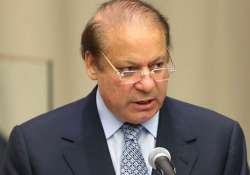India’s SAARC pullout: US asks Pakistan to act against terror safe havens
In the backdrop of India’s decision to boycott the 19th SAARC Summit to be held in Islamabad in November, the US today said that it continues to pressurise Pakistan to act against terror safe havens within its borders.

In the backdrop of India’s decision to boycott the 19th SAARC Summit to be held in Islamabad in November, the US today said that it continues to pressurise Pakistan to act against terror safe havens within its borders.
Washington also called for ‘de-escalation of the political discourse’ between India and Pakistan.
“Well, I mean, clearly we've talked about that before is, while we've seen Pakistan make progress on some of the terrorist groups operating within its own borders and carrying out attacks within its borders, that we continue to put pressure on Pakistan to respond to those groups who are, quote/unquote, 'seeking safe haven on Pakistan's borders', that -- who are intent on carrying out attacks elsewhere in the region," US State Department deputy spokesperson Mark Toner said.
Following the September 18 cross-border terror attack on an Indian Army base at Uri in Jammu and Kashmir, India on Tuesday said it would not attend the 19th South Asian Association for Regional Cooperation (SAARC) Summit to be hosted by Pakistan. Prime Minister Narendra Modi was scheduled to go for the event.
India has launched a diplomatic blitzkrieg after the Uri attack that claimed the lives of 18 soldiers with External Affairs Minister Sushma Swaraj saying at the 71st session of the UN General Assembly that the world should isolate nations that harbour terrorists.
New Delhi has blamed the Pakistan-based Jaish-e-Mohammed terror outfit for the early morning attack.
On Tuesday, Foreign Secretary S Jaishankar summoned Pakistani High Commissioner Abdul Basit and made a demarche that proved Islamabad's links to the Uri attack.
Modi has said that India would revisit the 1960 Indus Waters Treaty that calls for sharing of the waters of the six rivers of the Indus basin with Pakistan while indicating that the most favoured nation (MFN) trade status granted to the neighbour in 1996 might be revoked.
In his briefing, Toner said: "We want to see closer relations and a normalisation of relations, frankly, between India and Pakistan."
"It would be the -- to the benefit of the region. And we want to see de-escalation in the political discourse between the two countries and greater communication and coordination between them," he said.
The US is one of the nine observers of Saarc, the others being Australia, China, the European Union, Iran, Japan, Mauritius, Myanmar and South Korea.
According to sources, Bangladesh too has conveyed that it will not attend the Islamabad event due to interferences in its internal affairs "by one country".
Afghanistan and Bhutan have also voiced reservations about attending the summit while Sri Lanka has said that the event would not be possible without India's participation.